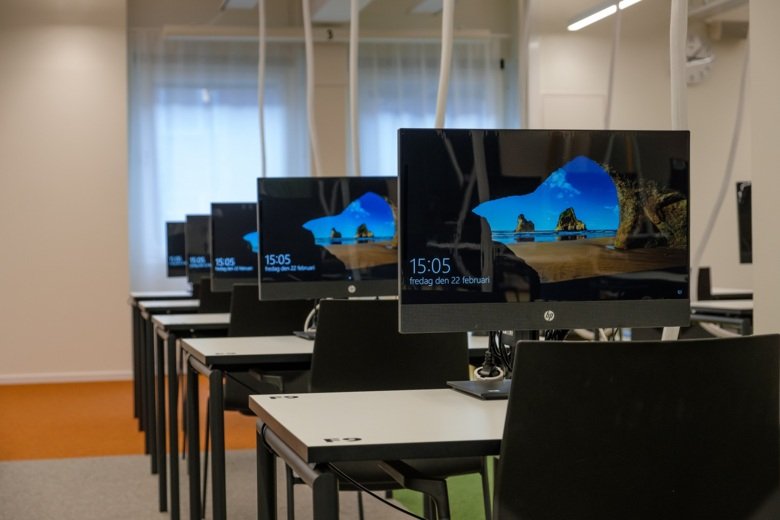Digital examinations offer new opportunities
Karolinska Institutet now facilitates for all educational programs to use digital examinations. Digital examinations are legally secure and efficient as well as allows for new possibilties for teachers and course administrators to develop the education programs.
Examinations are an incredibly important tool since it defines what students focus on in a course, says Annika Östman Wernerson, Academic vice president of education at KI.
"To be able to conduct the examinations digitally opens the door to new possibilities, where questions can be put into a context, for example a clinical context, with the help of pictures, films or web-based tools."
This makes the teachers’ jobs easier and in compliance with the rule of law.
"It can sometimes be difficult to interpret handwritten answers, and it becomes easier to provide comments and feedback. Some of the questions can also be corrected automatically, which gives the teachers more time to correct other questions. I hope that it will also stimulate the teachers to further develop the examinations. The system makes it easy to visualise and analyse the examination statistically," says Annika Östman Wernerson.
Ultimately this will benefit the health care system.
"If our students undergo exams in a way that stimulates understanding and in-depth learning it will benefit future patients," says Annika Östman Wernerson.
Computer equipped examination rooms

The examination rooms in BZ at Campus Solna and in Neo at Campus Flemingsberg have been equipped with 250 respectively 175 computers for examination, which opens the door to larger courses to take examinations. It is the result of a venture that has been ongoing since January 2018 in collaboration between several parts of KI, among others the university library, the facilities office, the IT department and the Committee for Education, which is also financing the project.
The work has focused on two aspects:
- acquiring the correct equipment and creating the conditions needed in the rooms to be able to conduct digital examinations.
- to create a management organisation that can conduct digital examinations in the future with issues surrounding law, technology and pedagogy, an organisation that is under construction.
The selection process of computers began with an investigation.
"We rather quickly found that in order to guarantee legal security and uniform exams together with secure computer operations we needed permanently installed equipment owned by KI," explains the project leaders from the university library, Joakim Jedholt and Bodil Moberg.
The computers have been equipped with software in order for digital examinations to be conducted at KI.
"In an exam, only those who are taking the exam have access to the exam plus applications on the computer allowed for the exam, like for example a calculator or pharmaceutical information. The answers are stored in the cloud, not in the computer, so that if there is a power failure everything is saved," says Bodil Moberg
Decreasing the risk of cheating

Minimizing the risk of cheating has been a top priority
"We have ensured that all computers are equipped with secrecy filters and confidentiality protection. The questions can be arranged in individual order in the program, so that everyone is not working on the same questions at the same time, which is considerably harder with traditional paper exams," says Joakim Jedholt.
The project leaders have also studied how other universities work with digital examinations.
"In particular, we have been impressed by the work done at Oslo University, where the number of e-exams have skyrocketed and there is an efficient organisation that manages all examinations. We have also conducted study visits at Stockholm, Uppsala and Gothenburg universities," says Joakim Jedholt.
The first digital examination in the new examination rooms will be held in the end of February-beginning of March, with no lack of tension felt by the two project leaders.
"It feels kind of like getting up on stage for the first time. But we are convinced that it is going to work out well," says Bodil Moberg.
Three advantages to digital examinations
- Offers more opportunities for students to demonstrate their knowledge.
- The teachers can better assess the students’ answers and their own exams.
- Increased compliance with the rule of law since the risk of cheating and misinterpretations of answers decreases.
Quality and the compliance to the rule of law
"We teachers will be saving loads of time in correcting the exams, time that we can use to prepare questions and analyse the results. It will also make it easier to keep track of examination data and store questions. It also feels good from a sustainability perspective to stop handing out stacks of paper to the enormous amount of students who are taking the examinations," says Marie Dahlin, Course Coordinator and moderator for Clinical Medicine with an emphasis on neurology, senses and psyche at the Medical Program KI.
